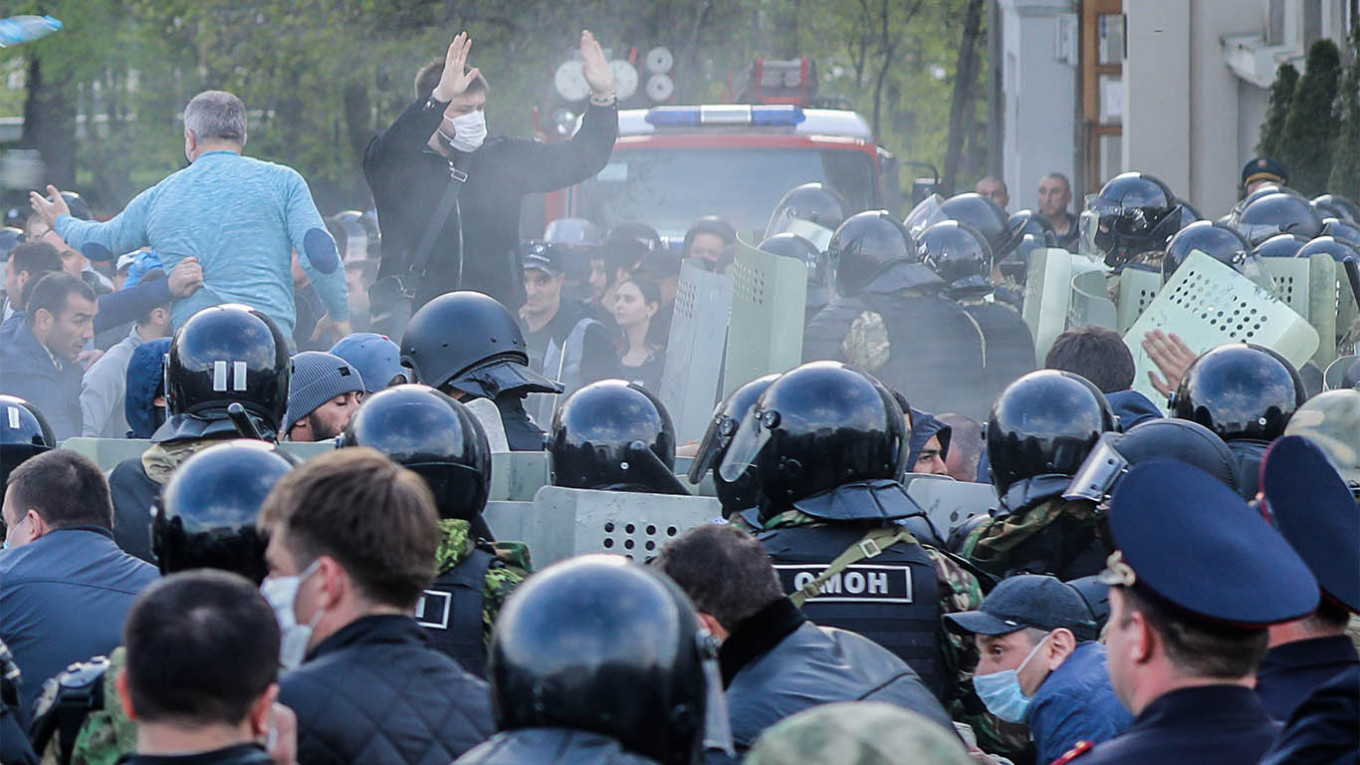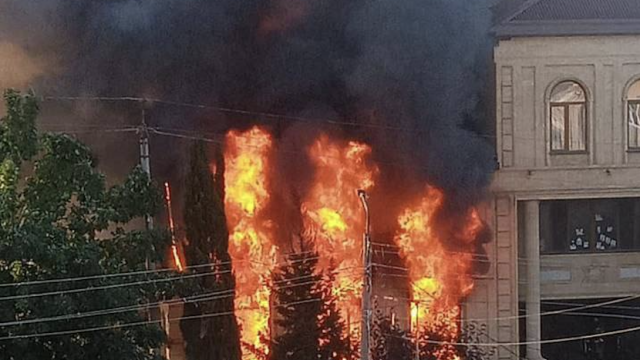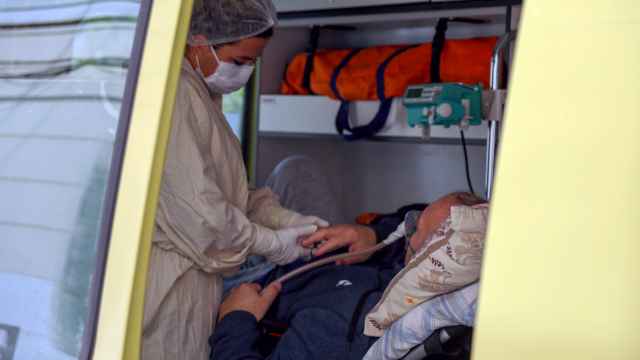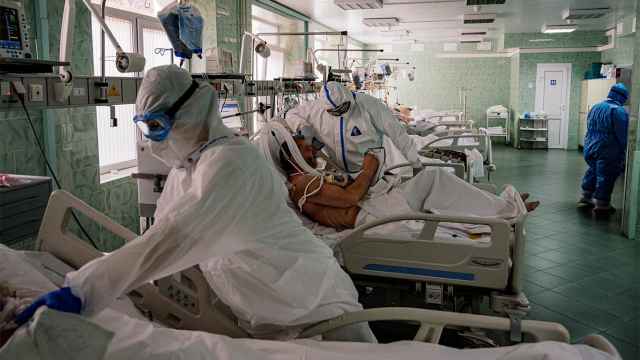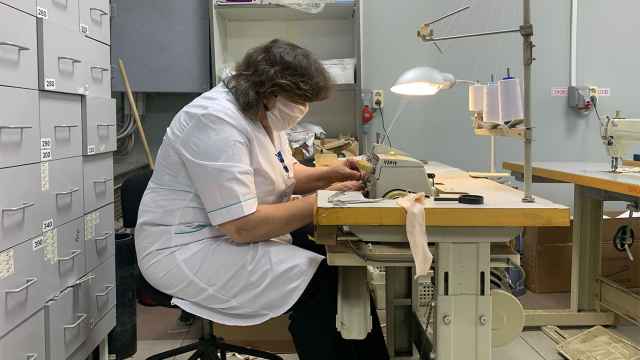On April 20, around 2,000 protesters gathered in Freedom Square in the heart of Vladikavkaz, the sleepy capital of Russia’s mountainous North Caucasus republic of North Ossetia.
Flouting the self-isolation regime imposed weeks before to combat the tiny autonomous region’s escalating coronavirus outbreak, demonstrators reeled off their demands: an end to lockdown, emergency financial support, the resignation of the regional government.
The situation was serious enough to bring the head of the republic, Vyacheslav Bitarov, out onto the street to negotiate with the protesters himself.
“I didn’t invent this virus,” he said.
Not all of those present believed him. While the demonstration had drawn a broad spectrum of North Ossetian society with various grievances onto Freedom Square, it had been called by Vadim Cheldiev.
An opera singer and longtime local celebrity, Cheldiev is the face of North Ossetia’s so-called “Covid dissidents,” a movement that has become notorious in the republic for spreading conspiracy theories about the coronavirus.
In a video message broadcast to his followers before the rally, Cheldiev railed against the “non-existent coronavirus” as part of a government plot to “enslave the people.”
Outside Vladikavkaz, a cellular mast was burnt down, an act linked by Bitarov to the debunked conspiracy theory that 5G mobile technology caused the coronavirus.
Only days after Cheldiev’s supporters took to the streets, North Ossetia’s Covid-19 outbreak began to spin out of control. By mid-May, it had the most confirmed cases per head in the entire North Caucasus.
Though the coronavirus pandemic has nurtured conspiracy theories all over the world, many North Ossetians blame the prominence of local Covid dissidents on a much older and more deeply rooted conspiracy culture championed by Cheldiev — the Soviet Citizens.
Soviet Citizens is an ex-U.S.S.R-wide movement believing that, because of a 1991 referendum in which a majority of the Soviet electorate voted for the preservation of the U.S.S.R., the Soviet Union still legally exists, and that they are citizens of it. They consider the Russian Federation to be a private offshore company registered in the U.S. state of Delaware, controlled by the U.S. government and illegally occupying the rightful territory of the Soviet Union.
Not considering themselves bound by Russian laws, Soviet Citizens have organized themselves into parallel government structures that mimic old Soviet institutions. The head of the “Politburo,” a retired Moscow surveyor named Valentina Reunova, commands her own KGB, finance and justice ministries. With local organizations in all but two Russian regions, Soviet Citizens nationwide can receive government decrees via Reunova's YouTube channel, which has 51,500 subscribers.
North Ossetia, where nostalgia for the U.S.S.R. runs deep, is a particular stronghold for the Soviet Citizens. Aside from Cheldiev, who publicly announced his membership earlier this year, in 2019 local TV reported that the North Ossetian branch — which calls itself the North Ossetian Autonomous Soviet Socialist Republic and operates out of Vladikavkaz — had 1,200 members in a republic of only 700,000.
According to Ruslan Totrov, editor of the independent Vladikavkaz news site OsNova, much of the Soviet Citizens’ appeal in the region stems from North Ossetia’s experience under Soviet rule. Having avoided the deportation and oppression suffered by their Muslim neighbours during the Soviet period, the predominantly Christian inhabitants of the region often see themselves as having benefitted from a close relationship with Moscow.
An enduring affection for Stalin also helps. The Soviet leader, born in neighbouring Georgia, is widely believed to have been of at least partial Ossetian ancestry, and the republic has over twenty monuments to the dictator, many recently erected.
“Stalinism is a religious phenomenon in Ossetia,” said Totrov.
Soviet citizenship also has economic appeal in the impoverished region. Harking back to the U.S.S.R.’s paternalistic welfare policies, Soviet Citizens refuse to pay utility bills, taxes or fines, while claiming they are entitled to free housing and higher pensions. One Vladikavkaz energy company has reported receiving two or three letters a week from Soviet Citizens refusing to pay their bills.
Escalating crisis
As the coronavirus crisis has escalated, Soviet Citizens in North Ossetia and nationwide have thrown their weight behind various pandemic conspiracy theories without taking a unified position on whether the coronavirus actually exists.
On social media, Soviet Citizens accounts have claimed the coronavirus is fake, that it is a U.S. government bioweapon and that it is being orchestrated by powerful figures such as Bill Gates and George Soros as part of a plot to take over the world.
Such content often appears next to more traditional conspiracy tropes, such as anti-Semitic conspiracy theories, fears of a New World Order and even with U.S right-wing Pizzagate and QAnon conspiracy theories promoted by some Donald Trump supporters.
According to Mike Wood, a researcher on conspiracy theories who has lectured at Britain’s University of Winchester, this is typical of conspiracy theorists.
“The biggest predictor of belief in any given conspiracy theory is belief in other conspiracy theories. That means conspiracy theories tend to be eclectic, borrowing from each other quite freely,” Wood said.
One Vladikavkaz Soviet Citizen, who spoke to The Moscow Times by phone under condition of anonymity, said she believes coronavirus is an artificial bioweapon likely genetically engineered by global elites to control the population.
“Ultimately, it’s Israel that’s doing all this,” she said.
Fertile ground
Though the Soviet Citizens are an extreme fringe group, local observers stress their role — bolstered by Vadim Cheldiev’s celebrity status — in spreading Covid-19 conspiracy theories in North Ossetian society more generally.
“Most Covid dissidents are not Soviet Citizens,” said Totrov. “But they were the first people to start talking about these ideas, and did make a big contribution to making them so popular.”
However, Indira Gabolaeva, a prominent activist and member of the small, hardline Stalinist Communists of Russia party, suggested that the causes of North Ossetia’s coronavirus conspiracies run much deeper.
“A lot of people here always assume the media is lying, so when they started warning about the dangers of the coronavirus, they refused to believe in that, too,” she said.
In any case, the North Ossetian authorities do appear to be treating the Soviet Citizens as a serious threat.
They arrested Cheldiev on charges of incitement to violence for his role in the Vladikavkaz protest, and he has since been added to the Russian security services’ list of dangerous extremists. With several protesters currently being prosecuted, Totrov suggested this might herald a wider crackdown on Soviet Citizens, under new legislation criminalizing Covid-19 fake news, introduced in April.
Even so, some doubt that criminalizing conspiracy theorists will be enough to solve the problem.
“In North Ossetia, we have much greater freedom of speech than in the rest of the North Caucasus,” says Alik Pukhaev, a Vladikavkaz blogger. “But we also have very high levels of distrust towards the government.”
“Caucasian soil is just very fertile ground for conspiracy theories.”
A Message from The Moscow Times:
Dear readers,
We are facing unprecedented challenges. Russia's Prosecutor General's Office has designated The Moscow Times as an "undesirable" organization, criminalizing our work and putting our staff at risk of prosecution. This follows our earlier unjust labeling as a "foreign agent."
These actions are direct attempts to silence independent journalism in Russia. The authorities claim our work "discredits the decisions of the Russian leadership." We see things differently: we strive to provide accurate, unbiased reporting on Russia.
We, the journalists of The Moscow Times, refuse to be silenced. But to continue our work, we need your help.
Your support, no matter how small, makes a world of difference. If you can, please support us monthly starting from just $2. It's quick to set up, and every contribution makes a significant impact.
By supporting The Moscow Times, you're defending open, independent journalism in the face of repression. Thank you for standing with us.
Remind me later.



